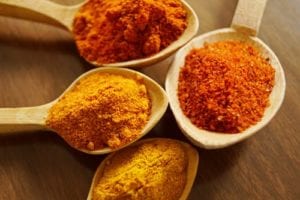Written by Taylor Woosley, Staff Writer. 10-day supplementation of 500 mg curcumin plus 5 mg piperine resulted in significant improvements in memory score (p = 0.002), inhibitory control and selective attention (p = 0.020), and total cognitive ability task (p = 0.024) compared to the placebo group.
 Premenstrual syndrome (PMS) is a common disorder of the luteal phase of the menstrual cycle and is characterized by moderate to severe physical and/or behavioral symptoms that impair daily activities1. Cyclic recurrence of psychological manifestations including irritability, insomnia, difficulty concentrating, severe fatigue, and anxiety can also be experienced during PMS2. Compared with those reporting no/mild PMS symptoms, women with moderate-to-severe PMS report decreased health-related quality of life, less participation in social activities, and more functional impairment in interpersonal domains3.
Premenstrual syndrome (PMS) is a common disorder of the luteal phase of the menstrual cycle and is characterized by moderate to severe physical and/or behavioral symptoms that impair daily activities1. Cyclic recurrence of psychological manifestations including irritability, insomnia, difficulty concentrating, severe fatigue, and anxiety can also be experienced during PMS2. Compared with those reporting no/mild PMS symptoms, women with moderate-to-severe PMS report decreased health-related quality of life, less participation in social activities, and more functional impairment in interpersonal domains3.
Various nutritional herbs such as turmeric, with its bioactive polyphenolic compound curcumin, has been researched for its antioxidant and anti-inflammatory properties4. Curcumin can interact with multiple molecular targets and modulate their activity including hormones, inflammatory cytokines, and enzymes5. Furthermore, it has a major role in the control of inflammation, cell proliferation, and angiogenesis6.
Bahrami et al. conducted a randomized, triple blind, placebo-controlled trial to analyze the effects of oral curcumin consumption on cognitive abilities in young women with both PMS and dysmenorrhea (painful cramping). Subject inclusion consisted of being between the ages of 18 and 24, with no severe gynecological disorders, experiencing moderate to intense dysmenorrhea and PMS. Participants were divided into either the curcumin group or the placebo group. Those in the curcumin group received a daily dose of 500 mg curcuminoids and 5 mg piperine and subjects in the placebo group received 500 mg lactose powder plus 5 mg piperine. Participants were instructed to take 1 capsule per day for 10 days, 7 days before menstrual bleeding and 3 days after the onset.
Cardiometabolic indices and dietary intake via a food frequency questionnaire (FFQ) were recorded at baseline. Primary outcomes included changes in the cognitive ability questionnaire (CAQ), which measures 7 specific aspects of cognitive function. Paired t-tests for continuous variables were utilized to examine changes from pre- to post-intervention within the groups. 57 participants in the curcumin group and 60 in the placebo completed the study. No significant differences between age, systolic and diastolic blood pressure, cognitive ability task, and dietary intake was noted between groups (p > 0.05). The curcumin group experienced a significant increase in memory score (p = 0.002), inhibitory control and selective attention (p = 0.020), and total cognitive ability task (p = 0.024). However, there were no significant differences noted between the curcumin and placebo groups regarding scores for decision making, planning, sustained attention, and cognitive flexibility (p > 0.05).
Results of the study show that curcumin improved the cognitive ability of women with PMS and dysmenorrhea. Further research using larger sample groups and longer study lengths should continue to explore the cognitive benefits of curcumin supplementation. Study limitations include the inability to ascertain whether a dose dependent effect of curcumin on cognitive function was present, the short follow-up, and the use of healthy young women which does not allow for generalizability of results.
Source: Bahrami, Afsane, Amir Masoud Jafari-Nozad, Samira Karbasi, Malaksima Ayadilord, and Gordon A. Ferns. “Efficacy of Curcumin on Cognitive Function Scores in Women with Premenstrual Syndrome and Dysmenorrhea: A Triple-Blind, Placebo-Controlled Clinical Trial.” Chinese Journal of Integrative Medicine 29, no. 5 (2023): 387-393.
©The Chinese Journal of Integrated Traditional and Western Medicine Press and Springer-Verlag GmbH Germany, part of Springer Nature 2023
Click here to read the full text study.
Posted July 12, 2023.
Taylor Woosley studied biology at Purdue University before becoming a 2016 graduate of Columbia College Chicago with a major in Writing. She currently resides in Glen Ellyn, IL.
References:
- Tiranini L, Nappi RE. Recent advances in understanding/management of premenstrual dysphoric disorder/premenstrual syndrome. Fac Rev. 2022;11:11. doi:10.12703/r/11-11
- Dilbaz B, Aksan A. Premenstrual syndrome, a common but underrated entity: review of the clinical literature. J Turk Ger Gynecol Assoc. May 28 2021;22(2):139-148. doi:10.4274/jtgga.galenos.2021.2020.0133
- Polak K, Nora P, Perry B, et al. Licit Substance Use and Premenstrual Syndrome Symptom Severity in Female College Students. Womens Health Rep (New Rochelle). 2022;3(1):443-449. doi:10.1089/whr.2021.0117
- Sultana A, Rahman K, Heyat MBB, Sumbul, Akhtar F, Muaad AY. Role of Inflammation, Oxidative Stress, and Mitochondrial Changes in Premenstrual Psychosomatic Behavioral Symptoms with Anti-Inflammatory, Antioxidant Herbs, and Nutritional Supplements. Oxid Med Cell Longev. 2022;2022:3599246. doi:10.1155/2022/3599246
- Arabnezhad L, Mohammadifard M, Rahmani L, Majidi Z, Ferns GA, Bahrami A. Effects of curcumin supplementation on vitamin D levels in women with premenstrual syndrome and dysmenorrhea: a randomized controlled study. BMC complementary medicine and therapies. Jan 22 2022;22(1):19. doi:10.1186/s12906-022-03515-2
- Vallée A, Lecarpentier Y. Curcumin and Endometriosis. Int J Mol Sci. Mar 31 2020;21(7)doi:10.3390/ijms21072440
